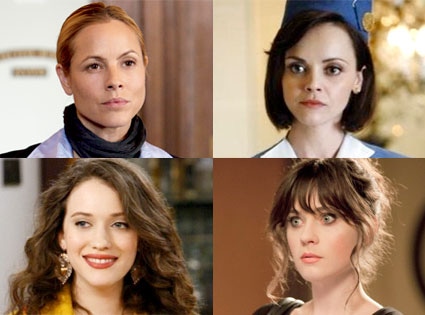 Patrick Harbron/NBC; Patrick Harbron/ABC ; SONJA FLEMMING/CBS; Isabella Vosmikova/FOX
Patrick Harbron/NBC; Patrick Harbron/ABC ; SONJA FLEMMING/CBS; Isabella Vosmikova/FOXWhy are there so many movie actors in so many fall TV shows? Is the movie industry hurting so badly?
—Charm, via Facebook
You speak, perhaps, of Zooey Deschanel, the manic pixie dream girl who has landed, like a fairy on a cloud of caffeinated cotton candy, as TV's New Girl? Or maybe you mean Maria Bello—you know, the actress with the hat that makes strangers want to fight each other to the death.
Or Christina Ricci, or Patrick Wilson, or Kat Dennings? The reason why they're all on TV is this...
In a nutshell: Low stress, high pay.
Sure, movies may have bigger budgets, but they also come with more risks for the average B-lister.
"Look at Avatar for example," says publicist Kyle Erickson, who has worked with Jessica Simpson, Paula Abdul and Mario Lopez. "It had the highest budget in movie history, but most of that money went towards the technology that is required to produce such high quality CGI."
Also, actors tie themselves up for months when working on a movie, but with a TV show, if it's canceled, they can commit to another job within days, making it easier to pay the bills. In other words, even if a TV show fails, an actor can look back and know it was a lower risk than committing to many types of movie projects.
Another factor: TV pay these days can keep a star in plenty of coin. Bello, for example, reportedly earns $125,000 per episode of the show Prime Suspect; that's the same reported paycheck that Deschanel rakes in for New Girl.
Wilson? More than $100,000 per episode for his show, A Gifted Man; and Jim Caviezel—remember Mel Gibson's Jesus?—commands about the same for the show Person of Interest. Of course I'm not even getting into the highest-paid on TV, such as Ashton Kutcher, reportedly earning a million per ep of you-know-what.
There's also reputation and earning potential to consider. These days, taking on a TV role can actually make an actor more expensive versus an unlucky movie star.
"The big difference between what an actress would make for a TV show and a mid-budget movie is that the show will pay the same amount every episode with potential for a salary raise, while taking a similar paying role in a movie that flops will only result in a lower paying role down the road," Erickson explains to me.
Fine, fine, but, really, is all that stability worth having to wear a hat like this?